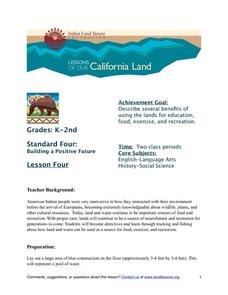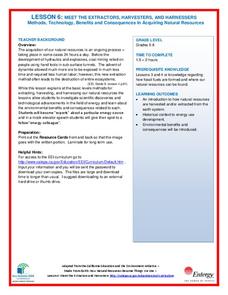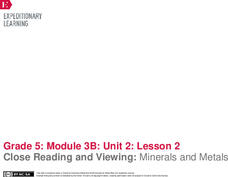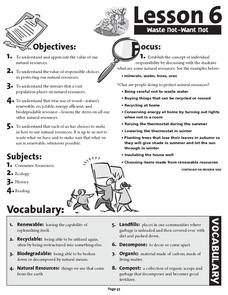Cal Recycle
Conserving Natural Resources
Trying to plan an engaging elementary science unit on natural resources? Conserve your energy! This five-part series of lessons and hands-on activities has exactly what you need to teach young scholars about the importance of conservation.
Indian Land Tenure Foundation
Gifts from Land and Water
With a series of fun hands-on simulations, young children can learn about conservation and natural resources. Your learners become land detectives, discussing and investigating the gifts that the land and water provide them. They then...
K-State Research and Extensions
Water
How are maps like fish? They both have scales. The chapter includes six different activities at three different levels. Scholars complete activities using natural resources, learn how to read a map, see how to make a compass rosette,...
Illinois Department of Natural Resources
Section One: What is Biodiversity?
Four intriguing and scientific activities invite learners to explore the natural resources of their town. The activities cover concepts such as genetic traits, organizing species in a taxonomy, the differences between different species...
Howard Hughes Medical Institute
The Making of the Fittest: Natural Selection in Humans
Sickle cell disease only occurs when both parents contribute the trait, and mostly in those of African descent. Where did it come from? How did it evolve? Tony Allison, a molecular biologist, noticed a connection between sickle cell and...
Illinois Department of Natural Resources
Section Two: Why is Biodiversity Important?
Explore soil, genetic traits, natural resources, and pollution in a series of lessons that focus on biodiversity. Kids complete experiments to learn more about the importance of varied genes and organisms in an ecosystem.
National Wildlife Federation
Meet the Extractors, Harvesters, and Harnessers: Methods, Technology, Benefits and Consequences in Acquiring Natural Resources
There are advantages and disadvantages to all sources of energy; the trick is determining which one has the least impact! Part six in the series of 12 has learners further explore energy resources. After reading information about one of...
Curated OER
The Effect of Natural Selection on Genes, Traits and Individuals
Rotating through five stations, evolutionary biologists explore the question of how changes in DNA facilitate the changes in a population over time. High-quality, colorful cards of animals, skeletons, skulls, and DNA sequences can all be...
American Physiological Society
Sticky Adaptations A Lesson on Natural Selection
Now you see it, now you don't! The stick bug exhibits the ability to disappear into a wooded environment. Why does this adaptation manifest in some species, but not in others? Life science students explore animal adaptations in nature...
Berkshire Museum
Nature Journaling: Experience the Outdoors Through Writing and Drawing
Step into the great outdoors and develop young scientists' skills of observation with a nature journaling lesson plan. Given a specific focus or goal, children practice making and recording observations of nature through written...
Howard Hughes Medical Institute
Natural Selection and the Evolution of Darwin's Finches
Darwin explained the connection between species of finches 150 years before scientists understood DNA. Technology and progressing science proved he was right, yet many struggle to understand how natural selection happens. Scholars use...
National Science Teacher Association
Middle School Sampler: Science
Focus on inquiry-based learning in your science class with a series of activities designed for middle schoolers. A helpful packet samples four different texts, which include activities about predator-prey relationships, Earth's axis and...
Curated OER
Land Plan Challenge
Links to two different versions of this mapping activity are available. In "The Small Version," youngsters design a town, keeping the water supply in mind. In "The Large Version," they also design a town, but they consider services and...
Curated OER
Marine Energy
In small groups, energy engineers research and make a topographic map of a marine natural resource. They report to the rest of the class pros and cons of extracting their assigned resource. The two activities may take up to four class...
Mascil Project
Molecular Gastronomy - Science in the Kitchen
Some say cooking is an art—and a science! Scholars scope out the savory subject of molecular gastronomy with a series of related activities. The teacher's guide contains printable worksheets and helpful tips for implementing the lesson.
Curated OER
Sustainability
Here is an in-depth, and incredibly thorough lesson plan on sustainable agricultural practices; specifically, regarding the growth of coffee. After completing and discussing a worksheet called "Thinking About Tomorrow," groups of...
It's About Time
Natural Selection
Are you the predator or the prey? Student groups participate in an activity to demonstrate the process of natural selection in a contained environment. After scholars complete the activity and questions, they apply their knowledge to a...
NOAA
Sustaining Our Ocean Resources
Lead young scientists on an investigation of fishery practices with the final installment of this four-part unit. Using a PowerPoint presentation and hands-on simulation, this instructional activity engages children in learning how fish...
Texas State Energy Conservation Office
Creating an Advertisement
Advertising for the purpose of influencing public policy regarding the use of alternative fuels is the focus of an innovative and engaging lesson. Learners are split up into six team in order to create an advertising campaign that...
Howard Hughes Medical Institute
The Making of the Fittest: Natural Selection and Adaptation
The pocket mouse can be light brown like the sands of the desert, or dark brown like the volcanic lava flows that are interspersed throughout New Mexico's Valley of Fire. It seems that predators have weeded out light colored mice in this...
Polar Trec
Nature's Density Column
Nature provides density columns in the polar regions that provides food for many animals. Young scientists build their own density columns with water in order to answer analysis questions. Through a slideshow presentation, scholars...
EngageNY
Close Reading and Viewing: Minerals and Metals
How easy is it to live off the land? Scholars read Minerals and Metals in Your Life and discuss how Canada's natural resources meet the needs of the people. Pupils watch a brief video and discuss the gist of the text and video. They then...
Core Knowledge Foundation
Cycles in Nature Tell It Again!™ Read-Aloud Anthology
A read-aloud anthology offers stories all about nature's life cycles. Over three weeks, second graders listen to and discuss tales about the cycles of daytime, nighttime, seasons, plants, trees, frogs, butterflies, and water. Following...
Forest Foundation
Waste Not - Want Not
Recycling is the focus in the sixth of a nine-lesson series devoted to forest ecosystems. Class members read an article about the responsible use of natural resources and ways to reduce land fill.

























